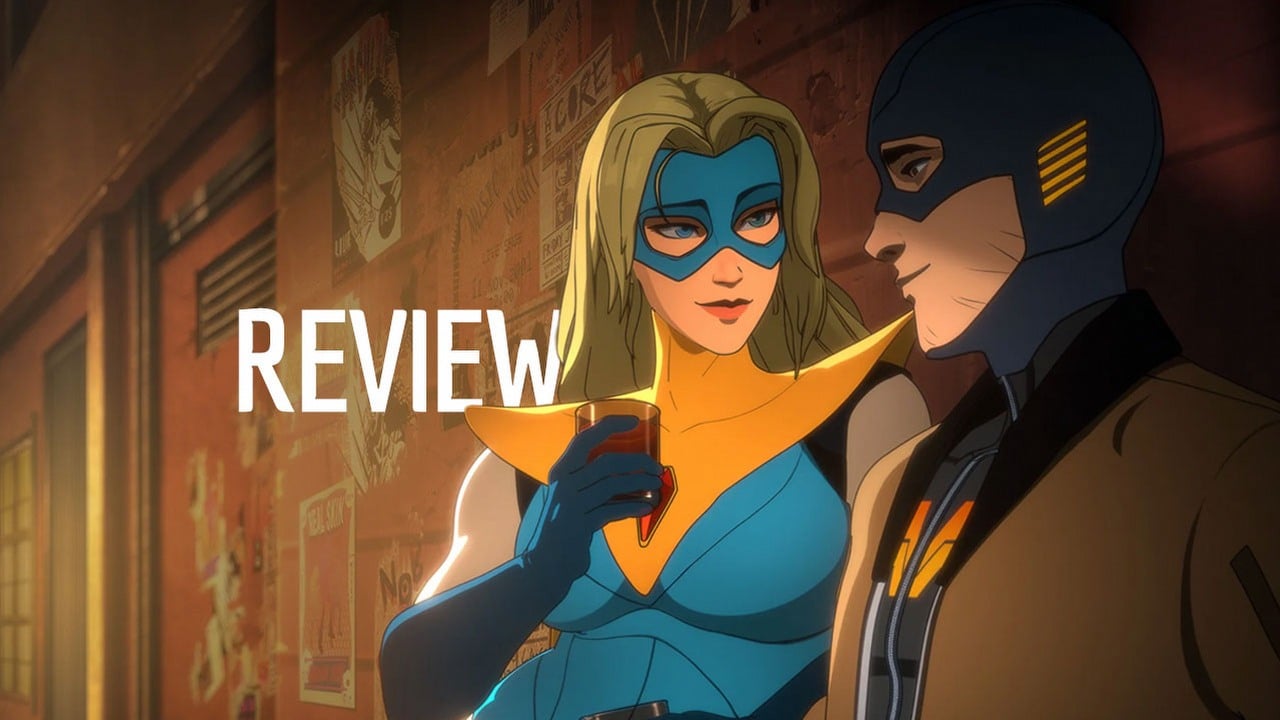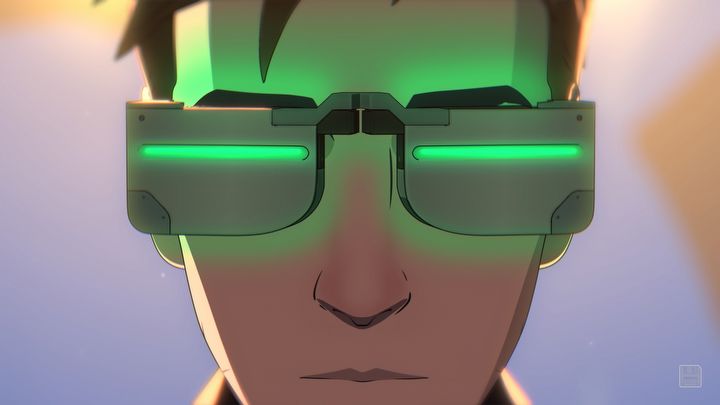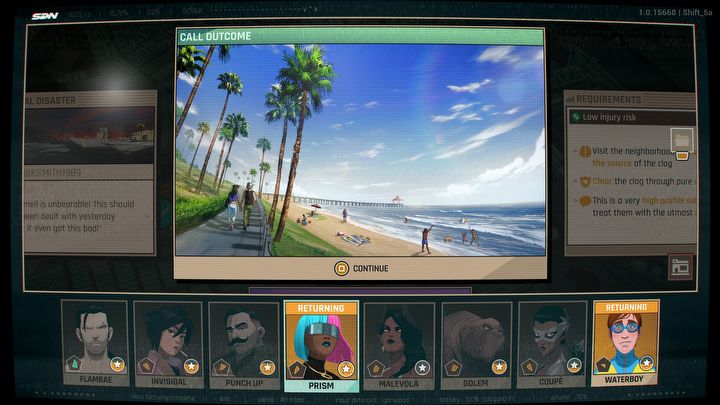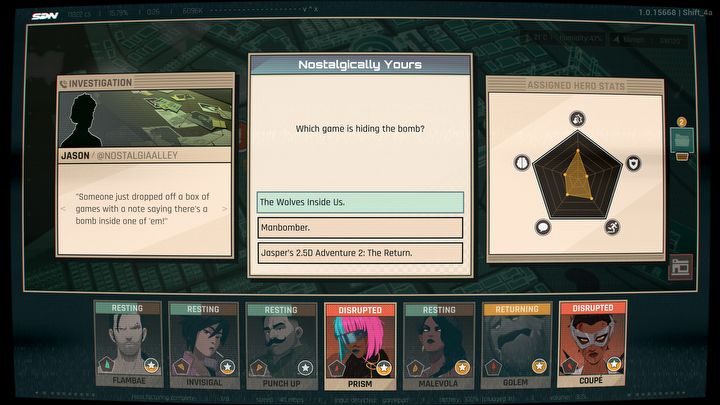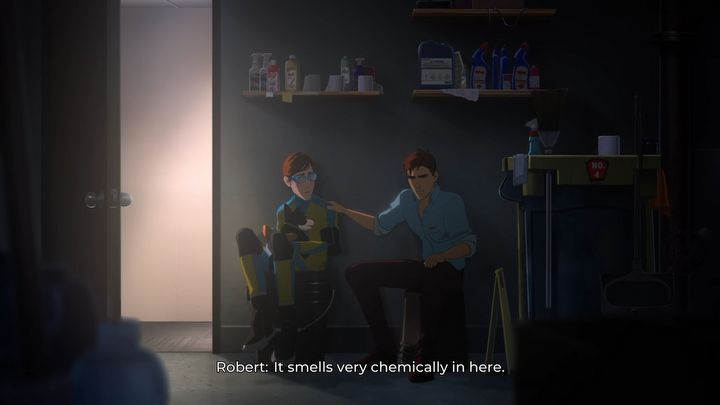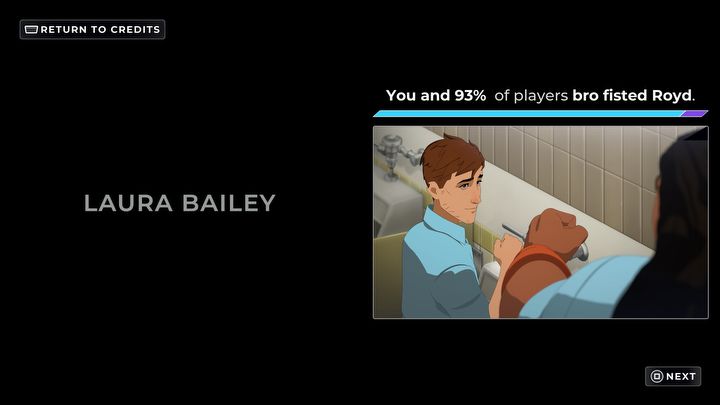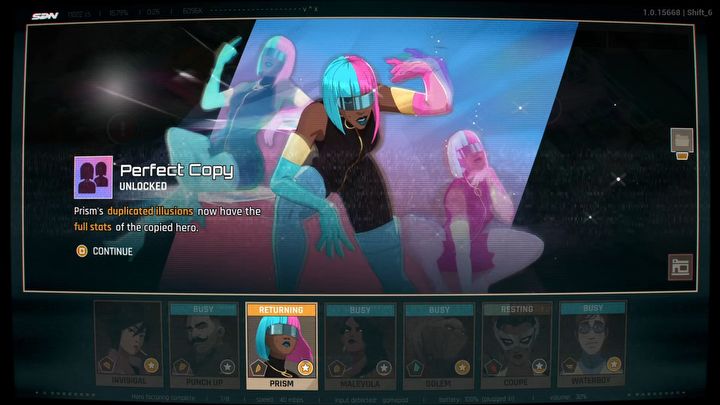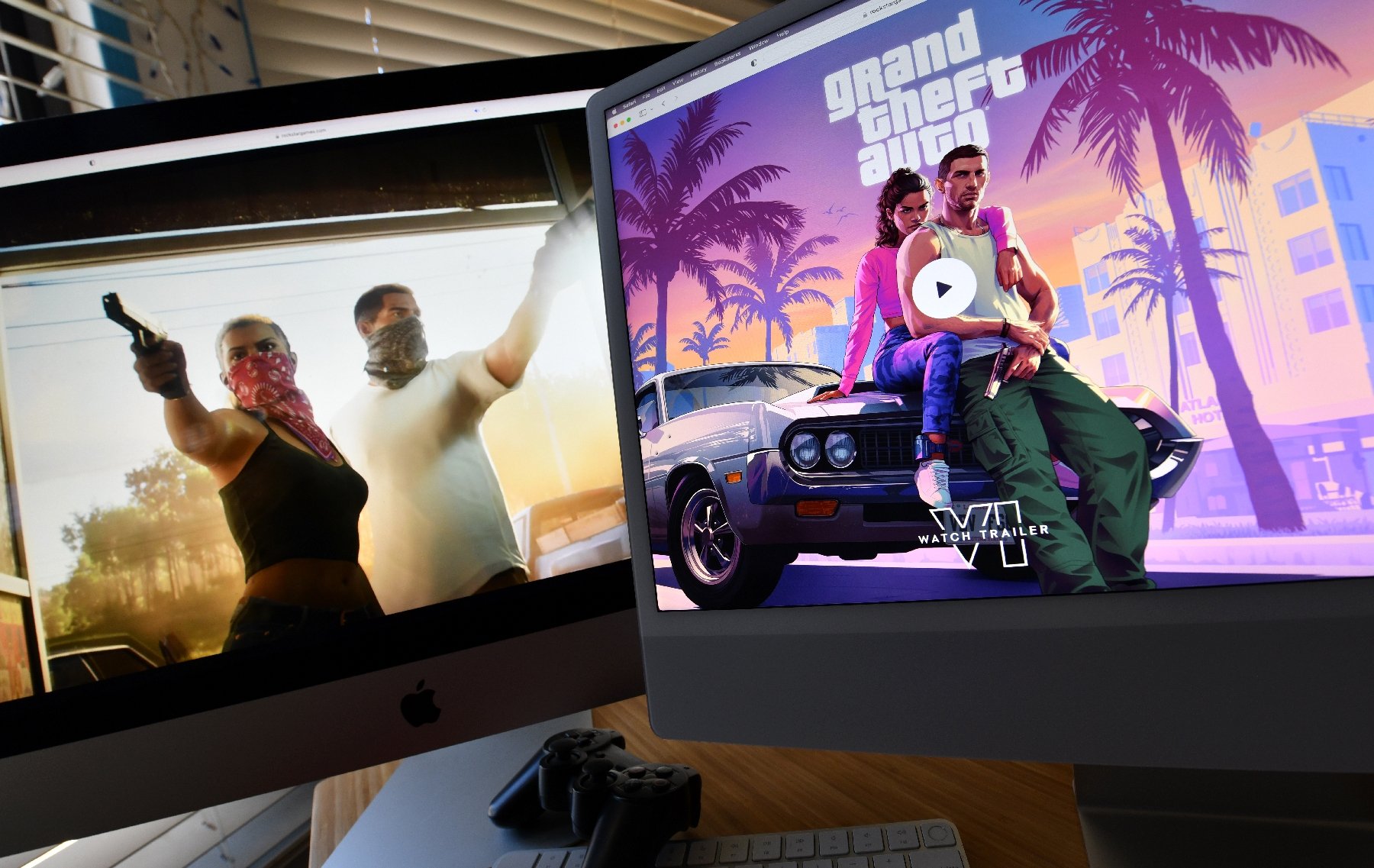The most difficult part of Dispatch is the wondering. As the timer ticks down on an important decision, your mind races from one option to the next. What will happen if I decide to cut Sonar or Coupe? What will happen if I go to the movies or go to dinner? What will happen if I lean in or push away? These are some of the questions that could easily keep a Dispatch player up at night, and they are a major reason why, before I even finished playing all eight episodes, I knew I would have to play at least a few more times just to see what the other outcomes could be.
But if you were playing each episode of Dispatch as they were released, two episodes per week from October 22nd to November 12th, there was that kind of wondering, too. Wondering what would happen in the next episode, but unable to play it for a week. Engaging in fan discussion online, theorizing what the twist would be, and what some of the characters were up to behind the scenes. It’s all of this that proved to me that an episodic release schedule can work wonders. Unlike most video games, which have a peak player count on launch weekend and then slowly drop off, Dispatch’s concurrent player count reached higher and higher peaks with each week. The hype, curiosity, and excitement would build leading up to and following each new set of episodes as new players were continually drawn in.
I personally believe Dispatch is one of the best games of 2025. I have been trying to determine if this is some kind of bias shining through from the lack of a quality Telltale release in so many years. Not to confuse any readers: while this is reminiscent of Telltale Games, and many of the developers once worked on those games, this is the debut title from AdHoc Studio, and I believe it stands equal to, or even higher than, Telltale at its peak. From the engaging dispatching gameplay, the difficult, meaningful choices, and the overall story of bringing a loveable team of misfits together, I could not recommend Dispatch highly enough to anyone who likes video games, and even those who don’t.
Learning to Dispatch
Dispatch has a clever tutorial. As Mecha Man, you infiltrate the villain, Shroud’s lair. Carefully take out henchmen and hack into a tablet to track down the villain’s exact location. This section introduces the quick time events that occur in action scenes and the decision-making at various points. Both consequential and less so. The infiltration goes horribly wrong, and Robert, the alter ego behind Mecha Man and protagonist of Dispatchnarrowly escapes, only to discover he has been sabotaged and his all-important Mecha Man suit is destroyed beyond repair. After a few months in a coma, Robert must finally come to terms with his non-superpowered self and what it means to be a hero.
Another hero, Blonde Blazer, tracks him down and, in perhaps a less-than-professional way, convinces him to join SDN, a subscription service that dispatches heroes to help the community. As a dispatcher, Robert may not be in the fight directly, but you’ll have to use your knowledge, experience, and wisdom to manage an unruly team of reformed villains and direct them to become true heroes.
Unlike the average video game, an episode of Dispatch often features extended scenes with no player input required. You can watch a scene play out and wait for a decision point, which only requires you to press one of the options presented. But for those who want a little more involved gameplay, that’s where the actual dispatching comes in. It’s a clever and engaging mini-game that comes up at least once, maybe twice, per episode.
There is Real Gameplay, Too
As this game has been released episodically, and the final two episodes were released last week, there has been time for the community to share their thoughts. By now, many people have shared their opinions on the dispatching gameplay. These are the sections of the game where the most input is required from the player. You have a view of Torrance, a small section of South Los Angeles, and as emergency calls come in, it’s up to you to send the right hero for the job. Each hero has their specialties. Some have a higher combat stat, others have higher defense, intelligence, charisma, or mobility. The better a match the hero is for the job, the better your chances of success. As your heroes succeed on calls, they gain experience and level up, adding one point to a chosen stat with each level.
As you can guess by my enthusiasm for explaining the minor details of this part of the gameplay, I enjoyed it more than the average player. Some players felt the dispatching challenges were like homework that helped further the story. Something they had to get through periodically just to move the story forward. But personally, I would play an entire game of just this. The challenge of balancing the use of your heroes for incoming calls is complex and engaging. Each hero has a unique ability that will impact how useful they are in certain contexts. The team at AdHoc Studio also manages to tie this gameplay into the story quite well. At various points, heroes will branch off on their own, ignore your directions, and otherwise sabotage their teammates in ways that make this more than just a challenge to unlock the next story beat.
That said, I wasn’t the biggest fan of the hacking mini-games. Maybe I’m a jaded video game veteran who is tired of seeing the trope of a “hacking puzzle” added to half of all games, but overall, this was a low point for me. It wasn’t the worst thing in the world. The puzzles were interesting and challenging, and their difficulty increased throughout the game, but I never felt they fully fit the game’s world. It felt too much like a last-minute addition to give the player something more to do and feel more involved in the dispatching sections. This can be effective, but for me, it is the lowest point of the Dispatch experience.
- Engaging and meaningful choices;
- satisfying and well-written arcs, characters, and dialogue;
- dispatching gameplay could be its own game.
CONS:
- Hacking rarely feels like it fits within the wider context, and it’s not always fun.
Story Puts the Team on Its Back
While the gameplay elements of Dispatch are great, it would not have gotten far without its story. We’ve seen the arc before: a group of misfit heroes or villains get their act together, learn to work together as a team, and decide to do the right thing. The list of movies, especially in the last decade, feels long. However, through the magic of an interactive video game, we get to be the driving force behind this arc, all while experiencing our own arc as well. This isn’t just something we are witnessing; it’s something we’re actively participating in.
In my playthrough, I didn’t pause. Honestly, not because I didn’t want to, I just didn’t think I could. But I’m glad I didn’t because this led to a much more honest and genuine experience, one where I reacted quickly and felt much more immersed in the story, characters, and relationships. Unlike most video games, there’s no way to hit a “game over.” Your decisions always push the plot forward, but it may not always be in the direction you wanted or expected. This is exactly why, long before the eight episodes concluded, I was ready to see what I had missed. Ready to play the game a second time before I had even finished it the first time. Excited to see what other avenues I haven’t yet explored and how they would change the experience. If you’ve played the game, you probably know some of the most important decision points I’m also thinking of. The end of episode 4 is a real doozy.
But all of these decisions wouldn’t mean anything without context. We know gamers love to make impactful decisions. In an RPG, that can vary based on what skills or stats to upgrade, but in Dispatchthe decisions only mean anything because of the relationships you’ve built and experienced. Each episode has its own mini-arc, and it’s at this point that I will say: spoiler warnings ahead.
Episode 5’s climactic decision is whether to tell the team you are Mecha Man or not, and from the very beginning, it revolves around your relationship with Flambae. If you tell the team, him included, he will likely have an adverse reaction. Are you afraid of the consequences of your past, or are you willing to accept what you may deserve? Episode 7 revolves around the parallel relationships Robert has with Chase and Invisigal. What is your responsibility in a situation where you ask Chase to run to the store to get you a beer, or if he sees how much you care for Invisigal and risks his own life to save her for you? What about Invisigal taking the risk to get the Astral Pulse? Is it a risk she takes for you? Or is she up to something else? What responsibility do you have when other people take actions on your behalf?
Aside from the well-crafted arcs, relationships, and characters, Dispatch is genuinely funny. It manages to balance the gritty realism and violence from shows like The Boys and Invinciblewhile also maintaining the quick-witted quips of the best Marvel movies. It doesn’t feel like it’s trying to mimic anything, or even that it’s trying to do something purposely alternative. Dispatch is a great modern sitcom; it just also happens to be a great video game at the same time.
VERDICT:
Dispatch is one of the most charming, engaging, and well-written games of the year. It might be a comedy, but it doesn’t shy away from difficult subjects. You must take on the role of a mentor to a team of misfit heroes, all while navigating your own demons, not to mention the actual demon on your team. The character arcs and the team’s overall arc are so satisfying and effective. I knew early on that this was a game I would play multiple times to see where different decisions would lead me. AdHoc Studio has instantly made a name for itself with this debut game.
Find all our reviews on Metacritic, Opencriticand CriticDB.
Final Thoughts
Dispatch asks you to be a mentor. How you decide to approach that task has implications for Robert, the members of the Z-Team, and the player. Even before the end of the game, I was already reflecting on every decision I had made, but I had to sit with my ending for a long time. What decisions had led to this? What could I have done differently, if anything?
There are so many great details that would take too long to cover entirely. The voice acting, from the veterans to the unexpected casting choices, is phenomenal. From what I’ve heard, the characters were tailored to their actors as much as possible, and everyone was given some wiggle room to add their own personality to the role, which works very well. There’s no character that feels wasted at any point.
The animation also knocked it out of the park, the art style rocked, and the character designs were so great that even the heroes with the smallest roles are fascinating. I want to know so much more about the character wearing the cat mascot costume, if that even is a costume. Plus, the underexplored team of villains working for Shroud, who all have unique powers.
A highlight of this experience is also discussing with other players the choices they made, how those choices changed the scene, and the overall experience. While the variance is not deep enough that everyone has a completely different experience, there are enough moments you will inevitably miss on your first playthrough or two. There are multiple decisions that have lasting impacts and make you feel the weight of your choices. As a mentor, a coach, and a boss, your decisions will almost always affect more than just you.
Dispatch falls squarely into the top-notch comedy sitcom that I will rewatch regularly and introduce to any friend I can convince to hold a controller. It gets some extra points for being a single season that can be at least a little different every time I play it, and significantly different a few times. There really isn’t much I have to complain about Dispatch. I really hope that AdHoc Studio decides to continue this series, but I’ll be looking forward to anything this team works on going forward.
